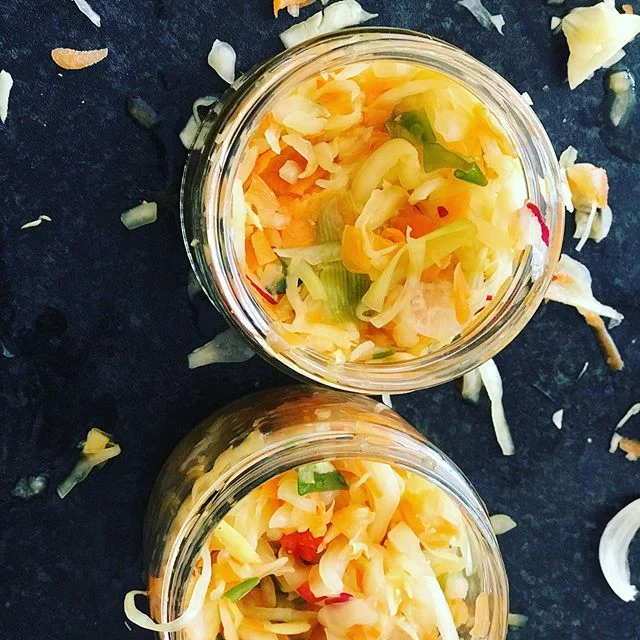If you suffer from digestive issues, know that you are not alone. Roughly 10- 25% of the UK population have IBS (Irritable Bowel Syndrome) and flare-up’s may occur on a weekly or monthly basis. If digestive issues persist for more than six months, and other conditions such as IBD Coeliac Disease, Chrones, and Bowel Cancer have been ruled out, then IBS is often diagnosed. (1)
The experience of IBS can be debilitating. Symptoms often include abdominal pain, cramping, bloating, along with changes in bowel habits, such as constipation, diarrhoea, or both. It can be very frustrating, and have a huge impact on quality of life.

The root cause of IBS may be due to a mix of environmental factors, gut physiology, and psychosocial factors such as:
- Dysbiosis (imbalance of bacteria in the gut)
- SIBO (small intestinal bacterial overgrowth)
- Parasitic infections
- Insufficiency of digestive enzymes/ bile acids
- Inflammation
- Food intolerances
- Vitamin D deficiency
- Poor diet
- Stress
- Sleep disruption
- Physical inactivity (3)
In order to ascertain the causative factors of IBS, a detailed history is recorded. Laboratory testing with Gi Ecologix can uncover the root cause of the issue. Testing shows the balance of bacteria in the gut and if pathogenic bacteria, fungal overgrowth are present. It also assesses gastrointestinal health markers for Helicobacter pylori, Inflammation, digestive enzyme function, bile acids, faecal blood, and the integrity of the intestinal lining.
The 5R Protocol is a well-established protocol I use in my nutrition clinic, and group programmes for helping bring relief to clients struggling with troublesome digestive issues. Here are the steps involved and how I help my clients to incorporate them.
1. Remove
Our food choices play an integral role in the management of IBS symptoms. As a general guide, temporarily removing foods that are known to irritate the gut is the first step. These include gluten, dairy, refined sugar, processed foods alcohol, and caffeine, also in some cases FODMAP’s (fermentable oligosaccharides, disaccharides, monosaccharides and polyols, which are short-chain carbohydrates (sugars) that may impair digestion). (2).
The next step is to incorporate foods, which are nutrient-rich and are easy to digest. As a nutritional therapist I guide clients to personalised food plans. I also recommend high-quality ready meal services for busy clients such as Field Doctor’s Low fodmap range. A food diary also can be a helpful tool during this process too, to understand eating habits and patterns and help identify which foods may be impacting IBS symptoms.

2. Replace
A balance of digestive enzymes, hydrochloric acid and bile acids are required for proper digestion. Digestive enzymes help to break down food and are produced in our saliva, pancreas, stomach & small intestine. Some enzymes may need to be replaced/ supplemented if compromised by diet, drugs, diseases, aging, or other factors.
A simple step to help to stimulate digestive enzymes in the gut, is to eat bitter foods before a meal, such as rocket and chicory, or bitter herbs such as gentian, dandelion, artichoke, and chamomile.
Another simple step to minimise bloating is to slow down and chew food properly, this breaks down food and stimulates the digestive enzymes present in saliva. One of the most common reasons for feeling bloated, is rushing our food or eating on the run, as it compromises this process.

It’s important to maintain healthy levels of beneficial bacteria such as Bifidobacteria and lactobacillus species in your gut. (5) You can help encourage these species to flourish, by incorporating probiotic foods, such as live yoghurt, kefir, kombucha, miso, sauerkraut, and kimchi into the diet.
A simple step to encourage beneficial bacteria is to add a spoon of live yoghurt to your morning muesli, or a spoon of Sauerkraut or Kimchi to your lunchtime salad or soup. Additionally, incorporating soluble fiber “prebiotic” foods, that beneficial bacteria feed on can encourage this further, such as oats, sweet potatoes, avocados, leeks.

4. Repair
Healing Inflammation, through maintaining the integrity of the gut lining is important to overcome IBS. You can help the lining of the GI tract repair itself by supplying key nutrients that can often be in short supply with IBS sufferers, such as zinc, antioxidants (e.g. vitamins A, C, and E), fish oil, and the amino acid glutamine. Collagen, found in bone broths and glutamine in cabbage-based soups and stews may help to support gut integrity too. Soups are often simple to prepare and can last a few days in the fridge. Why not try my Thai style pumpkin soup, or my Restorative Chicken Soup.

5. Rebalance
Our lifestyle choices can make a huge difference in managing symptoms of IBS. Sleep, exercise, and stress can all affect the function of the GI tract. (1) When the body is in a stressed state our absorption of nutrients is compromised, and vitamin C, magnesium and zinc stores are often depleted, so eating a variety of fruits and vegetables as well as nuts and seeds, may help keep these stores topped up, buffering the stresses and strains that may come our way. Introducing calming mindful practices such as meditation, yoga, walking in nature and enjoying a soothing bath has been shown to help to calm down the stress response and improve overall gut health. (4)

If you would like to explore further how diet and lifestyle can help you to manage IBS, I offer one-to-one, and group programmes to support you on your healing journey. Why not book a FREE 30 minute exploratory call with me, or check out the Nutritional Therapy Packages I offer.
Lucie 🙂
BA, Dip NT, mBANT
Check out these links for more support:
https://www.nhs.uk/conditions/irritable-bowel-syndrome-ibs/further-help-and-support/
Sources:
1- IBS diagnosis and management. https://pubmed.ncbi.nlm.nih.gov/16455728/
2 – Diet in irritable bowel syndrome : https://www.ncbi.nlm.nih.gov/pmc/articles/PMC5467063/
3 Causes of IBS: https://irritablebowelsyndrome.net/causes
4 Mindfulness-based stress reduction improves IBS https://pubmed.ncbi.nlm.nih.gov/32266762/
5 Probiotics in the treatment of irritable bowel syndrome https://pubmed.ncbi.nlm.nih.gov/19091823/

